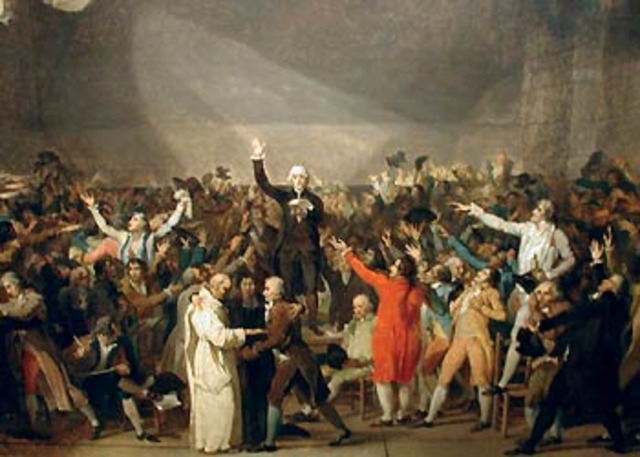In France's "ancien regime", the first (clergy) and second (nobles) estates paid little to no taxes (2% total taxes for the first estate, and 1% for the second) before the French Revolution in 1789. They also had special privileges and had some influence and power, but the nobles especially were afraid of losing their special place in society.
The third estate was a varied group of people. They included middle class bankers, lawyers, merchants and manufacturers. It also included doctors, journalists and professionals, but the majority of the third estate was made up of rural peasants and urban workers (the poorest) and urban unemployed. The third estate had few special privileges and had to pay the majority of the taxes (estimated 97% total taxes).
These inequalities, in addition to France's soaring national debt and the skyrocketing price of food, contributed to the revolution.
In America since 1913, we have had a progressive income tax - those who earn more pay the most. Back then, only incomes over $4,000 ($86,500 in 2010 dollars) were taxed (which applied to about 5% of the country).
During World War 2, the middle class really became included in the income tax in order to help pay for the huge price of the war.
But, the way our tax burden is distributed is much different than pre-revolutionary France. For instance, the lower class, or those who make less than $25-30,000 a year (for a family of four) pay about 5% of total tax amount collected every year by the IRS though they make up 15-20% of the population.
The American middle class makes up 60-70% of the population and pays around 45% of the total tax amount. The middle class earns between $30,000 - $200,000 / year.
An argument for
taxes from the Brookings Institute. Supreme Court Justice Oliver Wendell Holmes jr. has said, "I like paying taxes. With them I buy civilization."
The wealthiest 10% of Americans (those who earn over $200,000), because of our progressive tax system, pay about half of the amount collected by the IRS. That amount (50%), and in fact all of the amounts, have fluctuated depending upon the strength or weakness of the economy.
Currently, like France in 1789, our American government owes over $12 trillion to foreign investors and future payments to Social Security and Medicaid and Medicare.
1. Why do you think the French tax system was set up that way?
2. Do you think our current tax system is fair with the wealthiest Americans paying half of the tax amount collected every year? Why or why not?
3. What would you do to our tax system today to modify it? (
For instance, do you think our government spends too much money on social services / the military / other stuff? Would you lower taxes (and forbid it to borrow any money unless in an emergency) to force the government to spend less? Or, what about a flat tax where everybody pays the same percentage/rate?) Why?
150 words minimum total (not 150 words per question). Due Monday, March 29.



